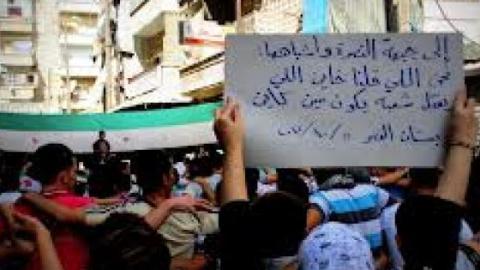“We will continue to demonstrate... And to hell with everyone”. These are the words of a renown activist from the Aleppo suburb Bustan al-Qasr, 27 months into the uprising that took Syrians to the streets to demand freedom.
His name is Wael Ibrahim, known as Abu Mariam.
Neither him nor the rest of the people who broke the barrier of fear in Aleppo in September 2011, relatively late compared to the rest of Syria, imagined that the road towards freedom would be so long and dangerous. With armed confrontation shaking Aleppo, the economic capital of Syria, their small town Bustan al-Qasr (The Palace Orchard) has become a model for peaceful resistance and self-governance after the withdrawal of the Syrian regime´s army. The town continues its struggle not only against the regime, but against anyone trying to steal their revolution and take its peaceful civil character away. As one of the signs from their countless demonstrations highlights, the people of Bustan al-Qasr inisist that "in the Syria of the future there will be no revenge but justice, and everyone without distinction will be held accountable for their actions."
At Syria Untold we believe that the story of Bustan al-Qasr is among the most significant within the Syrian uprising. This town came to the forefront of international media in January 2013, after dozens of men disappeared at regime checkpoints and were later found on the Queiq river, all of them shot in the head, their hands bound with plastic ties behind their back. The international coverage of Bustan al-Qasr, however, failed to cover the evolution of a town that has responded to shootings with sarcastic songs and banners, with drawings and graffiti, with endless peaceful demonstrations and with a sentence that has become a slogan: “We will stay. Here is our past, our present and our future.”

Bustan al-Qasr has become well-known for turning wedding celebrations into massive demonstrations for freedom, to the point that it has become difficult to distinguish between weddings and street protests. Weddings go from singing to the bride and groom to singing to freedom, and demonstrations have adopted the festive atmosphere of wedding celebrations, including honoring every martyr as if he or she was also a bride or groom.
https://www.youtube.com/watch?v=prDerVbd1PY
The people of Bustan al-Qasr work on two different axis:
- Civil initiatives against the regime, sit-ins, graffiti, decoration of the neighborhoods with revolution flags and mourning ceremonies for martyrs like activist Abdel Wahed Henawi.
- Resistance against the trend in militarization and radicalization associated to certain groups fighting the Syrian regime, to prevent them from taking over their revolution.
Serious differences exist between different opposition groups. Abu Mariam explains that the Jabhat al-Nusra fighters, that are allegedly connected to Al-Qaeda, have more funding and external support that the ones who aim for a civil state. Bustan al-Qasr has resisted this trend to the extent that Jabhat al-Nusra has renamed it “The Secular Town”.
Abu Mariam, who has been detained by Jabhat al-Nusra fighters three times, explains: “We decided to work together until we overthrow the regime, but there are essential differences between us and we will not allow them to steal our revolution.”
He adds:
“We want the world to know that we are still struggling for the same values that took us to the streets in 2011. We will continue, despite poverty, destruction and the unbearable pressure we are under. Despite unemployment and the lack of medical and humanitarian resources, despite the communication cuts and the lack of water, despite the fact that no one is helping us. Therefore our message to both the regime and the rest of the world is “We will continue, and to hell with everyone”.



